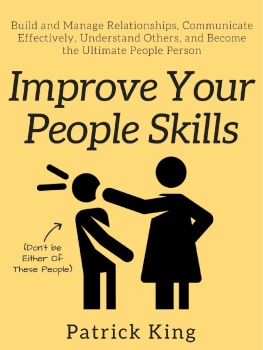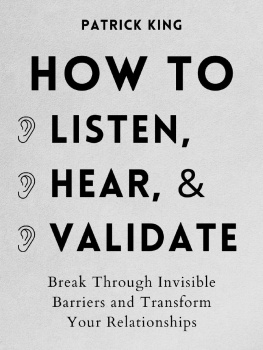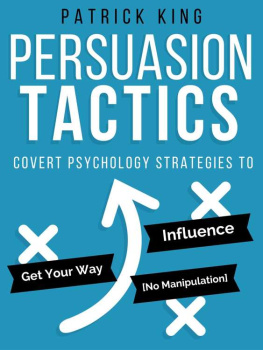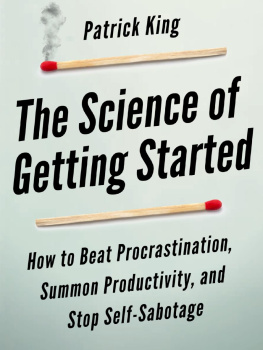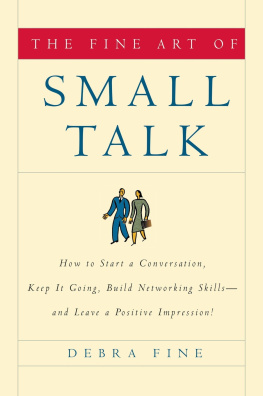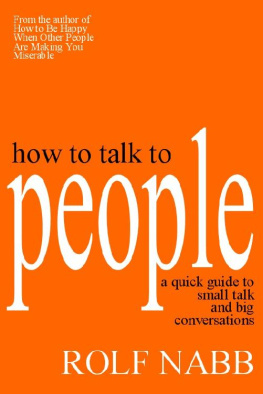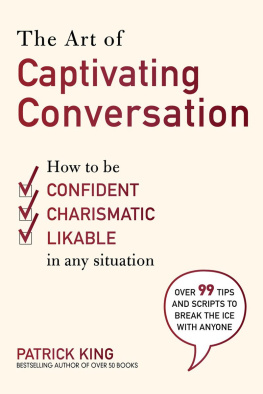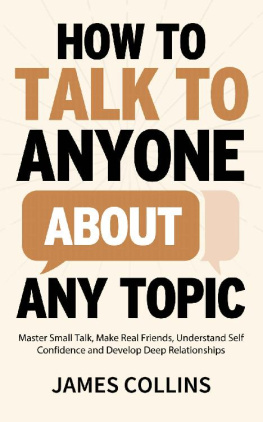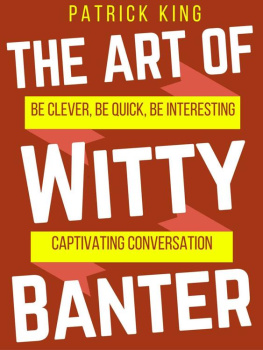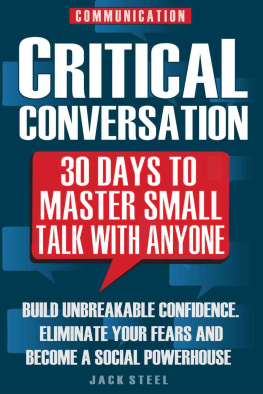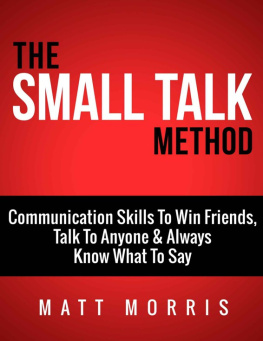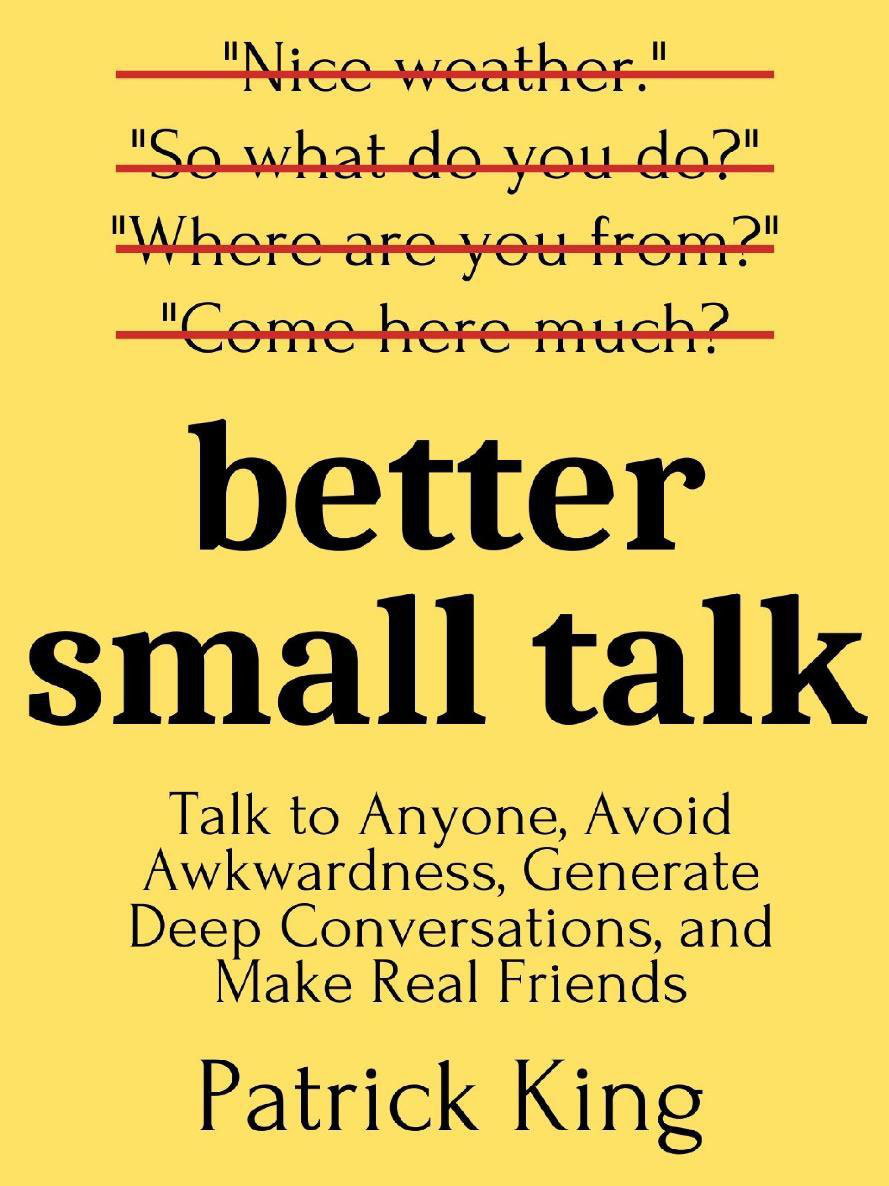Patrick King
Better Small Talk
Talk to Anyone, Avoid Awkwardness, Generate Deep Conversations, and Make Real Friends
Better Small Talk:
Talk to Anyone, Avoid Awkwardness, Generate Deep Conversations, and Make Real Friends
By Patrick King
Social Interaction and Conversation Coach at www.PatrickKingConsulting.com
As a FREE show of appreciation to my readers, Ive got TWO great resources for you:
>> CLICK HERE For The Flawless Interaction Checklist and Better Conversations Worksheet! <<
The Checklist describes in-depth the 7 essential components to exceptional interactions and conversations between you and everyone from a stranger to your partnerand The Worksheet puts a few of those components to the test with practice exercises that will instantly upgrade any conversation.
Learn how to:
Make people comfortable
Connect easily in any context
Develop killer eye contact
Prepare for any social situation
Appear as intuitive as a mind reader
Never run out of things to say
Practice and drill all of the above
CLICK HERE to download your FREE copy now!
Table of Contents
Better Small Talk: Talk to Anyone, Avoid Awkwardness, Generate Deep Conversations, and Make Real Friends
Table of Contents
The Small Talk Mindset
A Childlike Exercise
Your Conversation Rsum
Conversational Stages
Set the Tone
Make the First Move
Find Similarity
Manufacture Connection
A Life of Stories
The 1:1:1 Method
The Story Spine
Inside Stories
Ask for Stories
Create Motion
Think on Your Feet
Helpful Acronyms
The Oldest Trick in the Book
Two Ears, One Mouth
Ask Better Questions
Build Thyself
Branch Out
You Only See Black and White
Chapter 1. Ugh, Small Talk
Human beings are a social species. Connection is crucial to happiness, staving off depression, and keeping healthyliterally. Various studies have shown that the effects of loneliness are akin to eating a poorer diet and exercising less, and can ultimately lead to the same placean early death.
It might sound a little melodramatic, but companionship is literally the way our brains have been built to survive and thrive.
But for the purposes of this books topic, theres an even more important wrinkle: the quality of our interactions matters as well, not just the quantity or presence of other people around us. Sounds like even our brains despise small talk.
A 2010 study by Matthias Mehl had participants wandering around in their daily lives armed with a device that would record their audio environment over three days. The researchers analyzed how long each participant was in the presence of other people, and whether they were having casual conversations or were talking about more substantive matters. Basically, the aim was to capture what kinds of interactions these participants were taking part in, and the effect they had on their lives.
At the same time, the researchers also measured peoples overall level of happiness and mental and physical well-being. They found a clear correlation between substantive and deep discussions and greater well-being and happiness. Its something youve probably suspected or even felt before, but being vulnerable and open with others is a deeply satisfying activity on many levels.
As for small talk, that which is the opposite of substance and depth? Well, it drew a negative correlation with well-being and happiness, meaning it made people less happy. There you have it; real evidence that small talk is something to be avoided, or at least transition out of as quickly as possible.
Researcher Arthur Aron conducted a study in 1997, in which he paired participants who didnt know each other and gave them a list of fairly personal questions to ask. Although the questions were not offensively intrusive, they were more than just small talk. (Would you like to be famous and how? Do you have a secret hunch about how you will die? What is your most terrible memory? How do you feel about your relationship with your mother?)
Aron found that the participants responded to these deep dives with openness and intimacy. The participants didnt feel that the questions, as personal as they were, necessarily invaded their privacy or weakened them in any way. Instead, these questions encouraged honesty, more emotional fluency, and sincerity in the respondents. They felt closer to the other participants, who were complete strangers before the experiment. Future iterations of this study were given names such as How to fall in love with 36 questions because of the powerful effects it had on the relationships between the participants, which were previously nonexistent.
You probably already know deep in your bones what these two studies laid out: delving more deeply or intensely in our communications can create positive results far more swiftly than one might think. Now the question remains: how can we actually do that? In this book, I want to provide a framework, from beginning to end, about how to engage people more effectively and move beyond small talk. Well start even before the interaction begins with how you should prepare yourself, and move on through all the stages of small talk to arrive at something more meaningful.
At the prospect of reading this book, you might be overly excited about throwing yourself into the midst of a conversation and seeing what you can accomplish. After all, youre reading this book for a reason, and motivation can make you overeagerbut rushing in would be a mistake for the time being. It would be akin to running into battle without your shield, sword, or even pants.
The Small Talk Mindset
Theres more to conversation than thinking off the cuff and creating witty banter out of nothing at all. Very few of us are capable of doing that on a consistent basis, and whats more sustainable, easy, and practical is preparing for a conversation beforehand.
To be specific, youre not preparing for specific conversations like they are job interviewsrather, you are priming yourself to be able to shine in social exchanges in general. Theres a distinct difference between the two. When you prepare for conversations, youll find being witty much more available and even easy.
So the first step to witty banter and small talk is to get ready psychologicallyso youre not caught with your pants down in meeting someone new. What exactly does this mean? Think about when you just wake up and your voice is gravelly and incomprehensible. Your thoughts are unorganized and swirling, and anything that comes out of your mouth is likely to be responded to with a what did you say?
When youre only half-awake, youre caught off guard when you have to respond to anything, and you have a lack of focus and awareness. This is our social status quohow we normally move through and navigate the world. So warming up mentally is about beginning to stretch and gingerly flex our social muscles so were ready for action.
If youre out at a bar or networking event, you only have one shot at making the right impression. If you fall flat on your face, as will inevitably happen from time to time, guess what? That was your one shot at the goalwill you make the most of it?
Recall that as children, we were always admonished to never talk to strangers. This well-meaning instruction might have served us well in our childhood, when we were likely to be gullible prey to sly criminals. Stranger danger was a real thing to be avoided.


